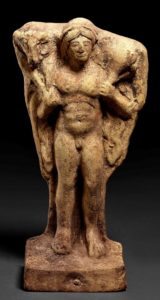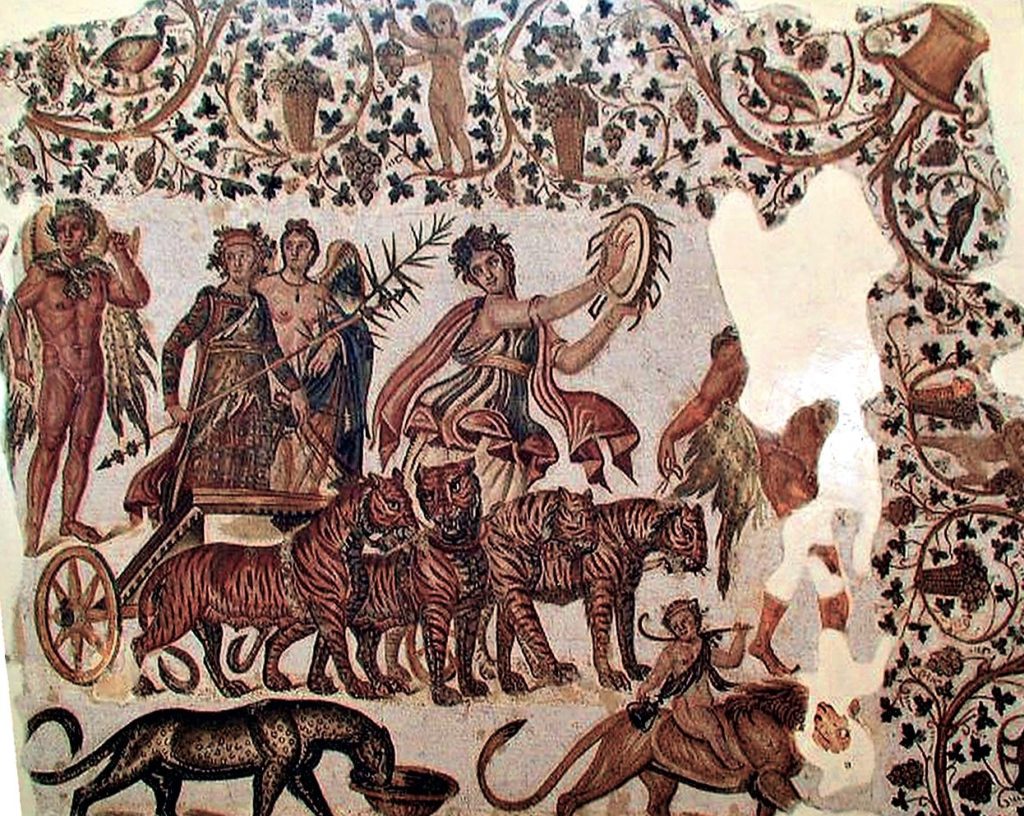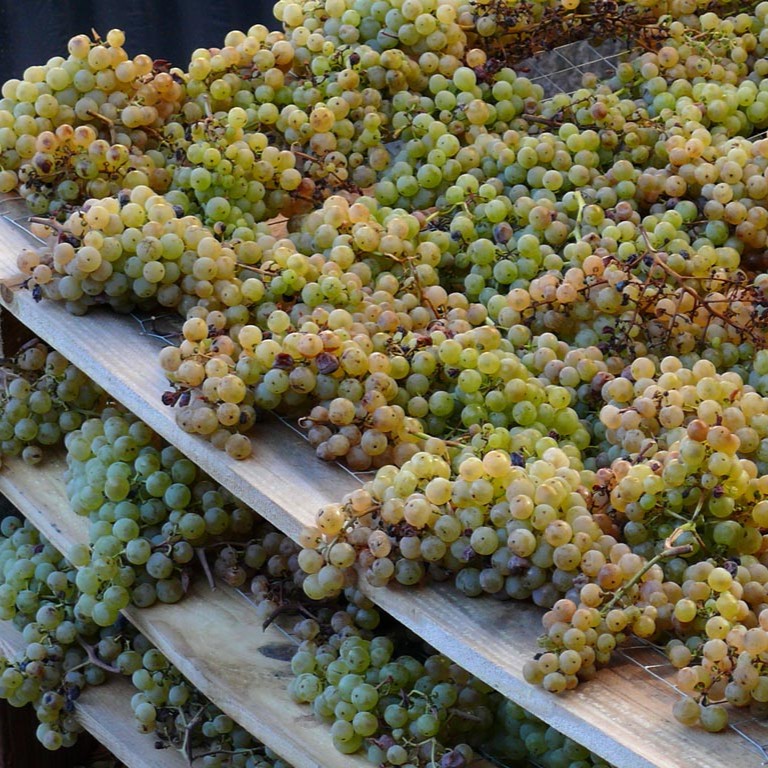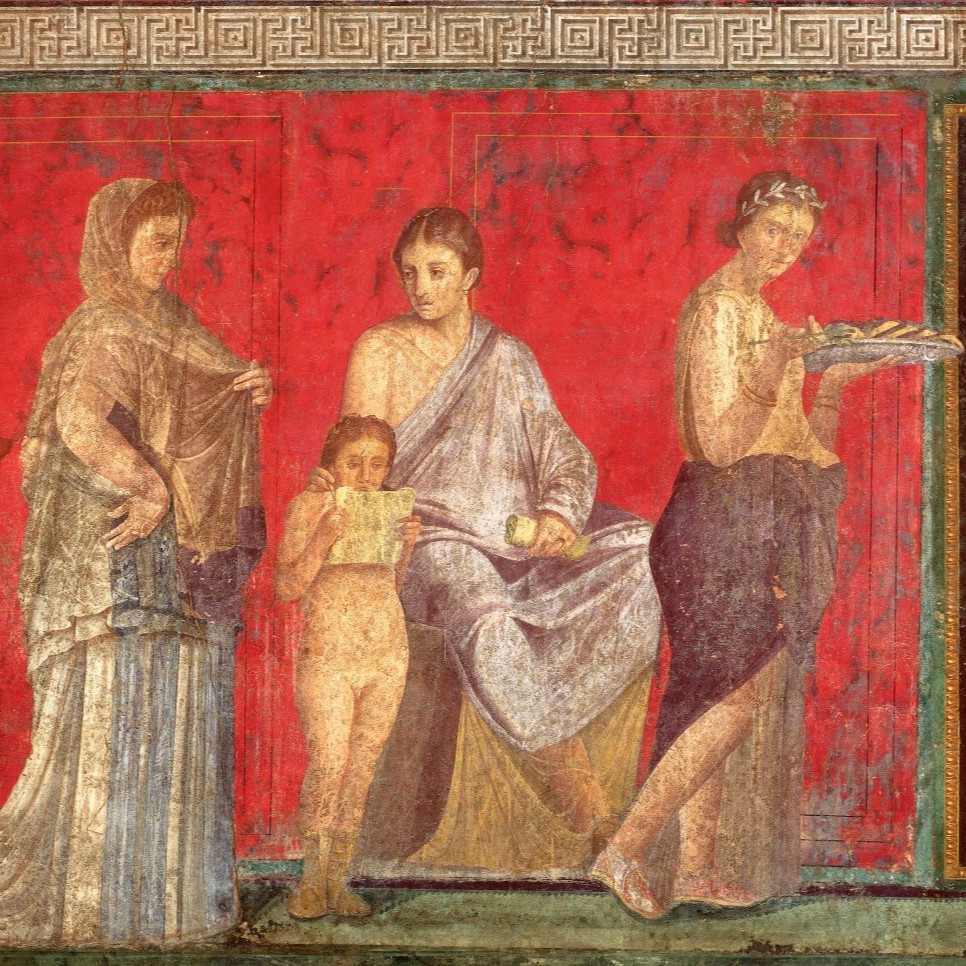
Translated from French with DeepL (please notify us of errors)
The idea of combining the harshness of wine with the sweetness of honey could only come from a god. In this case, Aristaeus, son of Apollo and the nymph Cyrene, according to Pliny the Elder[1], a Roman author of the 1st century. Aristaeus -Aristaios in ancient Greek- is a little-known rural divinity whose cult spread from Greece to Sicily, Sardinia and even on the Giens peninsula, in Hyères (France), where a sanctuary dedicated to him has been discovered. He is the archetypal good god: in addition to having invented honeyed wine – or mulsum – he cured illnesses on his way. Like his famous colleague Hermes, Aristaeus was represented as a good shepherd with a sheep on his shoulders, a figure that would later become very popular as the embodiment of another character…
But let’s get back to honeyed wine. The beverage was consumed since the dawn of time in the Hellenic world. The poet Homer mentions it in the Odyssey[2]. As with so many other things, the Romans owe the mulsum to the Greeks.
Several Latin authors give recipes, including Columella[3], Persia[4], Apicius and Palladius. The manufacturing process varies. Sometimes, as in Columella, wort and honey are mixed before fermentation. More often, the mixture is made afterwards. Spices frequently complete the composition. Apicius is a bit of a one-upmanship: he gives a complex manufacturing process intended to produce, on the one hand, a “marvellous honeyed wine” (condita paradoxum) and, on the other hand, “a honeyed wine that can be preserved eternally” (conditum melizomum perpetuum) [5].

For the Romans, mulsum was not to be drunk lightly; it was not lora (piquette) or even merum (pure wine). It was drunk as an aperitif (gustatio) or at banquets for special occasions. The historian Titus Livius[6] and the poet Plautus[7] tell us that victorious soldiers were rewarded with it during a triumph. In a play that greatly inspired Molière, Plautus portrays a miser who tries to bargain with the goddess Fides: if she helps him discover a pot full of gold, he will offer her a cask full of mulsum[8]. It’s like having your cake and eating it too, as we would say today.
In addition to being delicious, mulsum was reputed to be healthy. Quoting Varon, Pliny indicates that jaundice was nicknamed “royal disease” because it was treated by drinking honeyed wine. He also specifies that “this beverage reminds one of one’s appetite; taken cold, it relaxes the stomach, and taken hot it commonly tightens it”. Then he gives an anecdote: to the emperor Augustus who asked him how he stayed in shape until he was 100 years old, a certain Romilius Pollio answered: intus mulso, foris oleo (honeyed wine inside, oil outside) [9].
Such a treasure could not disappear with the Roman Empire: after having survived anonymously, it reappeared in the 14th century under the name of hypocras. A name given in honour of Hypocrates the physician, to underline the curative virtues of the drink. Another tribute to Greece.
[1] Pliny, Naturalis historia, XIV, VI (53)
(53) Vino antiquissimo claritas Maroneo in Thraciae maritima parte genito, ut auctor est Homerus. neque enim fabulosa aut de origine eius varie prodita consectamur, praeterquam Aristaeum primum omnium in eadem gente mel miscuisse vino, suavitate praecipua utriusque naturae sponte provenientis.
“The most ancient wine is that of Maronea, on the coast of Thrace; Homer speaks of it. I will leave aside the different fables and traditions about the origins; I will only note that Aristaeus, from the same country, was the first to mix honey with wine, two natural products of the first excellence.”
[2] Homer, Od., IX, 1 97
[3] Columella, 12, 194.
[4] Persia, 87.
[5] Apicius, I, I (1-2)
[6] Titus Livius, 38, 55, 2.
[7] Plautius, Bacchis, 1074.
[8] Plautius, Aulularia, 621.
[9] Pliny, Naturalis historia, XXII, LIII
(113) Semper mulsum ex vetere vino utilissimum, facillimeque cum melle concorporatur, quod in dulci numquam evenit. ex austero factum non inflat stomachum, neque ex decocto melle, minusque implet, quod fere evenit; adpetendi quoque revocat aviditatem cibi. alvum mollit frigido potu, pluribus calido sistit, corpora auget.
(114) multi senectam longam mulsi tantum intrita toleravere, neque alio ullo cibo, celebri Pollionis Romili exemplo. centensimum annum excedentem eum divus Augustus hospes interrogavit, quanam maxime ratione vigorem illum animi corporisque custodisset. at ille respondit: intus mulso, foris oleo. Varro regium cognominatum arquatorum morbum tradit, quoniam mulso curetur.
“As for honeyed wine, the best is that made from old wine: the honey is incorporated very easily, which does not happen with sweet wine. Made with astringent wine, it does not swell the stomach; nor does it swell it if the honey has been boiled, and it causes less flatulence, the usual drawback of honeyed wine. This beverage stimulates the appetite; taken cold, it relaxes the stomach, and taken hot it commonly tightens it.
It makes you overweight. Many have reached a long old age by eating nothing but bread in honeyed wine; Pollion Romilius is a famous example. He was more than a hundred years old when the god Augustus, his guest, asked him by what means he had maintained such vigour of body and mind: “Honeyed wine inside, oil outside,” he replied. According to Varro, jaundice was nicknamed the royal disease because it was treated with honeyed wine.”
Other articles in English from the Nunc est bibendum blog








